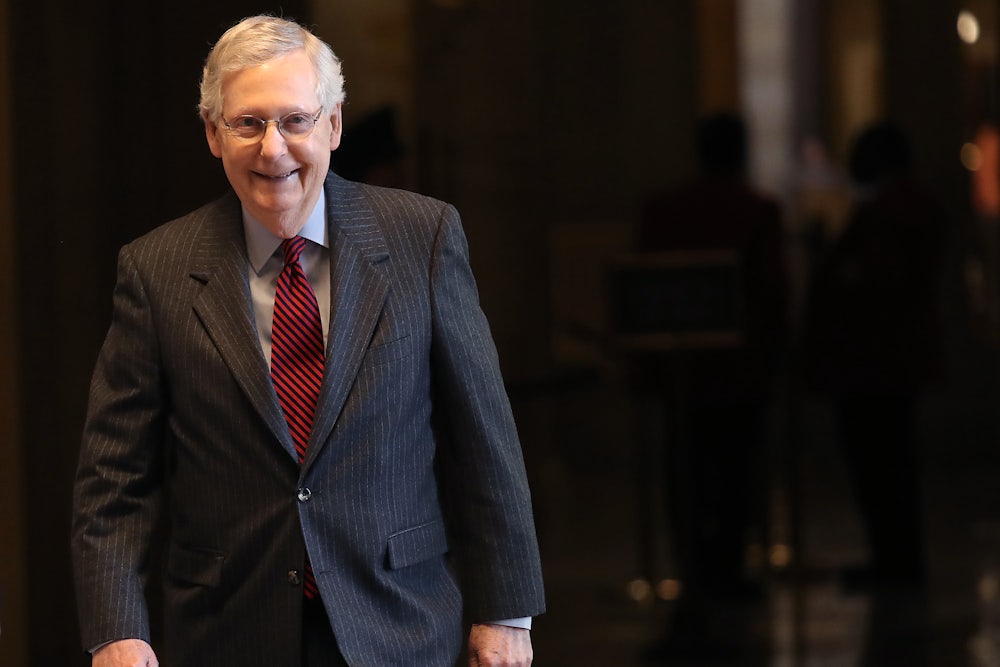With much of Washington focused on griping over an infrastructure bill and the makeup of a House committee that will investigate the January assault on the U.S. Capitol, Senate Minority Leader Mitch McConnell opted for a throwback: holding the debt ceiling hostage for the sake of obstructionism.
“I can’t imagine there will be a single Republican voting to raise the debt ceiling after what we’ve been experiencing,” McConnell told the political newsletter Punchbowl News on Tuesday evening. “I can’t imagine a single Republican in this environment that we’re in now—this free-for-all for taxes and spending—to vote to raise the debt limit.… I think the answer is they need to put it in the reconciliation bill.” Raising the debt limit through the reconciliation bill might not be possible, however. A finished infrastructure package, which Democrats plan to pass via reconciliation, is almost certainly weeks away; the deadline to raise the debt ceiling is July 31.
This is classic McConnell, which is to say it’s classic GOP debt hypocrisy. For the last 40 years, whenever a Republican is president, conservatives in Congress have happily embarked on a bacchanalia of tax cuts and hikes on defense spending. Whenever a Democrat takes office, the GOP suddenly rediscovers its commitment to austerity, bemoaning the debt being passed on to our children. This hypocrisy is particularly acute when it comes to the debt ceiling, a pointless procedural quirk that doesn’t increase spending but allows debts incurred by already approved spending to be paid off. (The ceiling was temporarily suspended, quietly and without Republican protest, two years ago under Donald Trump.)
Newt Gingrich was the first Republican leader to weaponize the debt ceiling when he was speaker of the House in the 1990s, but battles over the limit became routine during the Obama administration. McConnell and other Republicans took the debt ceiling hostage on a number of occasions, flirting with economic catastrophe in the middle of the most significant recession since World War II. These maneuvers were not done out of principle or financial prudence but represented a naked exercise in political gamesmanship. The hope was to stoke bogus fears about the debt, damage the economy, and prevent Barack Obama from winning reelection. It didn’t work, but the GOP is now running the same playbook on Joe Biden.
McConnell’s gambit is particularly rich coming after the Trump years. Not only did the national debt jump nearly 39 percent—thanks, in part, to the government response to Covid-19—the GOP was led by a president who had little time for the typical bromides of small-government conservatives. During the 2016 campaign and his presidency, Trump promised repeatedly not to cut Social Security and Medicare. Though his own policies didn’t always follow his rhetoric, there were few pleas for fiscal prudence from the right during his administration, even as the debt and deficit ballooned.
But the debt ceiling threat is in keeping with the McConnell tradition of ignoring Senate norms in favor of maximizing leverage. Why should Republicans vote to raise the debt ceiling, thereby making life easier for their opponents? Instead, they’ll add one more task to the stack of chores facing Democrats.
Senate Majority Leader Chuck Schumer is currently in the midst of a gamble to speed up the bipartisan infrastructure bill that Congress has spent the last several months working on; now he and other Democrats will also have to bother with the debt ceiling. McConnell and the GOP were never likely to lend a helping hand to Democrats. But he has evidently sensed an opportunity to play politics now that negotiations over infrastructure have turned more rancorous: We would have helped out, but Democrats are spending too much money, those dastardly liberals.
By washing his hands of both the spending package Democrats are preparing to pass via reconciliation and the debt ceiling, McConnell is also creating part of the GOP’s message for the midterms: The Democrats are engaged in an orgy of spending while prices on consumer goods skyrocket: Vote us into power so we can grind everything to a halt (and then give huge tax cuts to our donors once we regain the White House).
Given that Democrats control both chambers of Congress, they should be able to avoid a true crisis, but not without complications. The ceiling can be raised as part of a reconciliation package, but it’s unclear what else will be included in that bill, which could be weeks away from being finalized. If the July 31 debt ceiling deadline is missed, Treasury can take actions that ensure the government won’t run out of money—but those measures will only last until the fall.
But one question remains: Are voters even paying attention? A decade ago, a drama about the United States defaulting on its debt seemed catastrophic; today the right is consumed by conspiracies about vaccines and threatening to override the will of the voters in 2024. What once was a looming existential risk now seems quaint.








